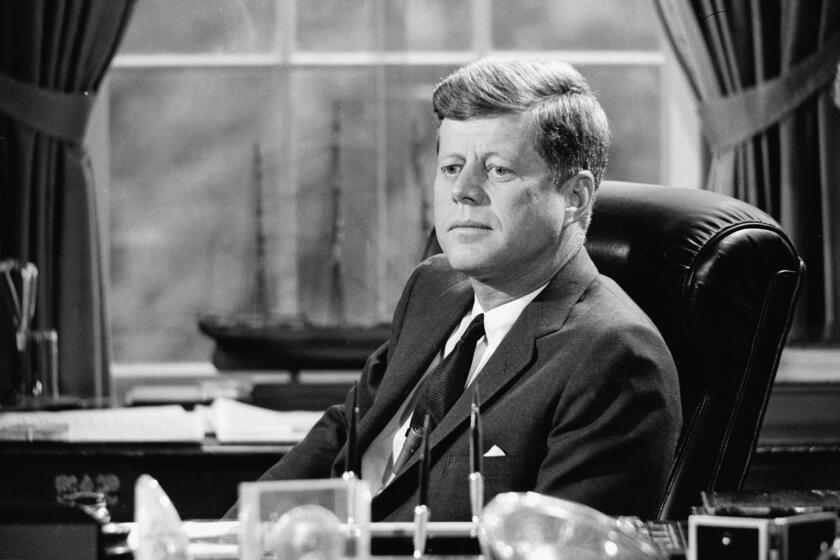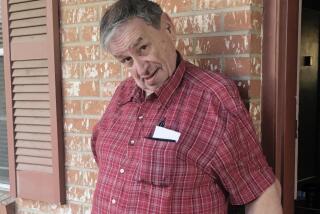Donald Shannon, Times correspondent who covered JFK and the Cold War, dies of COVID-19
WASHINGTON — Donald H. Shannon, whose 38-year career as a Washington and foreign correspondent for The Times included John F. Kennedy’s 1960 presidential campaign and the end of the Cold War in 1989, died July 17 of COVID-19. He was 97.
Shannon was one of the last surviving links to an earlier era at the Los Angeles Times; he joined the newspaper in 1954, six years before Otis Chandler became publisher and began transforming The Times from a provincial metropolitan paper into a nationally recognized journalistic enterprise.
Shannon was hired as the third member of what was then a two-person Washington bureau, increasing the staff by 50%.
That was an era when reporters often relied on personal relationships with high-ranking officials to get their stories. In 1954, when Shannon was assigned to cover important Supreme Court decisions, he compensated for his lack of legal expertise by telephoning an acquaintance from California, then-Chief Justice Earl Warren. In Shannon’s telling, Warren agreed to explain the court’s decisions to the young reporter each week, off the record.
The arrangement worked until Justice Robert H. Jackson died of a heart attack at his secretary’s home. When Shannon asked Warren if Jackson had a personal relationship with the woman, the chief justice stiffly replied: “Young man, please never call me again.”
Shannon stuck with the personal approach decades after it began to wane in Washington. In 1976, when one of Chandler’s daughters was reported missing during a trip to Guatemala, Shannon’s personal contacts came in handy again. He telephoned another acquaintance, then-CIA Director George H.W. Bush, to ask if the intelligence agency could help — and was quickly told that the young woman had been found unharmed.
Donald Hawkins Shannon was born Feb. 1, 1923 in Auburn, Wash. He graduated from Stanford University in 1944, served with U.S. forces in the Pacific theater from 1944 to 1946, and began his career as a journalist in 1947 at the English-language Brazil Herald in Rio de Janeiro.
In 1948, he traveled to Paris in hope of getting a job covering the United Nations General Assembly meeting there, only to discover that the city was awash in Americans hoping for the same job.
“After a while, I decided that it was getting close to starvation, so I decided I’d better get over to London because nobody wanted to work in London,” still recovering from the war, he recalled in an interview for an oral history project in Washington.
President Kennedy was a transformative figure, not just a charismatic celebrity.
After brief stints in London with United Press International and then with the Western Reporters news service in Washington, he joined The Times in 1954. He covered John F. Kennedy’s campaign in 1960, then served as a foreign correspondent in Paris from 1962 to 1965 and in Tokyo from 1966 to 1971, as a United Nations correspondent in New York from 1971 to 1975 and a national security reporter in Washington from 1975 until his retirement in 1992.
Shannon contracted COVID-19 at Bishop Gadsden Episcopal Retirement Community in Charleston, S.C., where he had been a resident for several years. He was treated for 10 days at Roper Hospital in Charleston, but died 13 days after first exhibiting symptoms of the disease.
Shannon married Sally Van Deurs, an attache at the U.S. Embassy in London, in 1952; their marriage lasted until her death in 2006. He is survived by a son, John McConville Shannon; a daughter, Susanna Shepard Shannon; and two granddaughters, Rebecca Oudin-Shannon and Samantha Christina Shannon.
More to Read
Start your day right
Sign up for Essential California for the L.A. Times biggest news, features and recommendations in your inbox six days a week.
You may occasionally receive promotional content from the Los Angeles Times.








